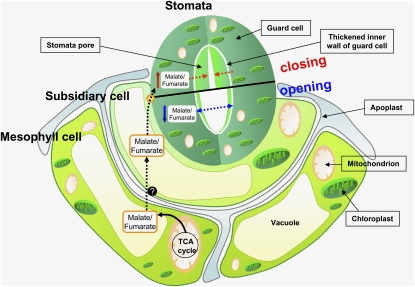Figure 14.
Mitochondrial Function Triggers Stomatal Movement by Regulating Organic Acid Levels.
The malate (fumarate) produced by the TCA cycle is transported to the vacuole, where it is stored. By an unclear mechanism, the level of organic acid is altered in the subsidiary cells, leading to an increased (decreased) concentration in the guard cells that culminates with the closing (opening) of stomata. Stomatal movement is additionally regulated by other well-characterized mechanisms (K+, Cl−ABA, and Ca2+); therefore, future work is required to fully understand the molecular regulatory hierarchy of this highly specialized cell type.

